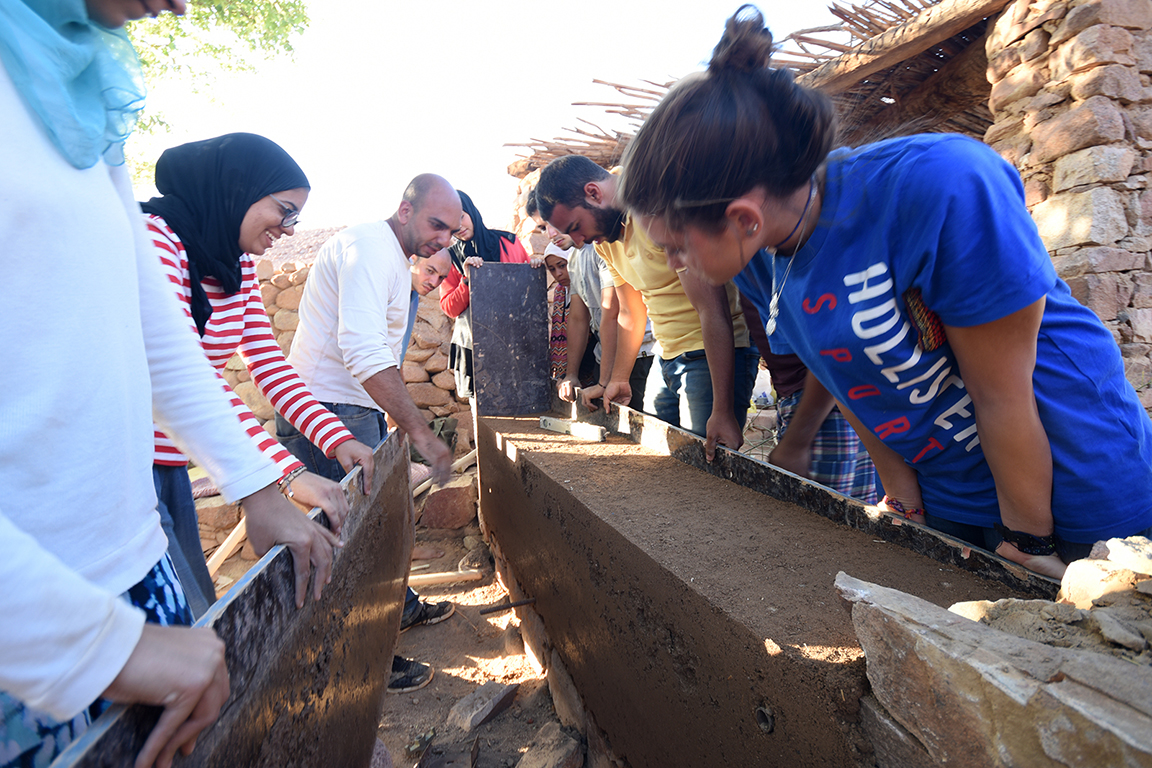Graduating from Ain Shams University with a degree in civil engineering, Radwa Rostom is an entrepreneur who went all the way from working as a structural engineer at a construction company to working in environmental consultancy, reforestation and solar power. Few years after, Rostom took a leap of faith and initiated her own startup to offer environmentally friendly services.
TELL US ABOUT HAND OVER AND HOW WAS THE IDEA BEHIND IT CONCEIVED?
Hand Over is a social enterprise that aims to utilize sustainable and locally sourced materials for the sake of community development. Our main approach is to design and build cost-effective, environment-friendly spaces to create sustainable communities. The idea was first conceived when I was an undergraduate student, I used to volunteer to teach kids how to read and write. Part of my work required doing surveys and field visits to their neighborhood. When I visited their houses, I felt more responsible- as an engineer studying construction- to help them live in a decent and humane houses, rather than help them with their homework. I decided at that time I need to do something about it, but back then I was still a student and I was not sure of the steps I need to take. I graduated and started educating myself more in several fields until 2014, when I applied for a fellowship program in Germany with the basic and undeveloped idea of helping underprivileged communities live in safe, resilient, and environmentally friendly houses. Through the last years, the idea evolved and became more stable, now we are a registered company, working on promoting environmental building solutions for all segments of the community. We operate through three main tracks: Community development, where we design and build sustainable structures such as housing units, community schools, health facilities, and community centers, mainly public spaces that could make underprivileged areas become more developed. The second track is the commercial track, we provide the same services for house owners and real estate developers. The third track is the education and awareness track, where we deliver sessions and workshops for architecture and civil engineering students and we launch campaigns to raise the awareness on the issues we target. In terms of our building techniques, we mainly depend on the available materials on the sites we work in. For the projects we implemented so far, we adapted the Earth construction technique, which is basically an ancient building technique that depends mainly on using mud, gravel, and sand. We implemented four projects in different regions: Abu-Qarn district in Old Cairo, Wadi Gharba in Saint Catherine, Al-Ayat in Giza, and in Cairo-Alexandria desert road.


WHAT OBSTACLES DID YOU FACE WHILE STARTING AND RUNNING YOUR STARTUP?
The most challenging point in the work we are doing is changing people’s mindset. People have been building with the conventional ways for many years and it is not very easy to convince them to go back to a technique that they refer to as modest or undeveloped. We have to convince them of the benefits and functionality of these techniques, their affordability and how they can satisfy their needs and comfort. Another obstacle was the business side, I come from an engineering background and I was not planning from the beginning to change the idea to a startup so I did not have a solid background on running a business, but I started to educate myself, I applied for fellowship programs, and I sought advice from experts and experienced entrepreneurs.
WHAT ADVICE WOULD YOU GIVE FEMALE ENTREPRENEURS WHO WISH TO LAUNCH THEIR STARTUPS?
I would advise female entrepreneurs to take a leap of faith and realize their ideas, no matter what challenges or obstacles they assume they will find. They need to take firm steps to validate their ideas and plans. They need to do their own research, take small but steady steps. I would also advise them to always evaluate each step and be flexible enough to accept changes and modifications. They should also always be connected with the market they are working in, stay updated and stay connected with the other players, stakeholders, and surround themselves with a good support system; whether fellow entrepreneurs, team, advisors, family members and friends. Also to reach out for help and seek advise.

DO YOU THINK THERE ARE CURRENTLY ENOUGH FEMALE ENTREPRENEURS HAVING THEIR OWN STARTUPS?
I do not usually think of it in terms of gender, female entrepreneurs have the same skills and opportunities as male entrepreneurs. They just need to believe in themselves and the community will accept them. In terms of opportunities, I think we are even luckier than male entrepreneurs because some opportunities are only directed to females. I personally do not believe that there is a certain constraint because of the gender, I am working in a field that is known to be a male-dominated field and the obstacles I face have nothing to do with my gender. I think generally we need more entrepreneurs and especially social entrepreneurs who have new approaches of finding solutions to basic needs.